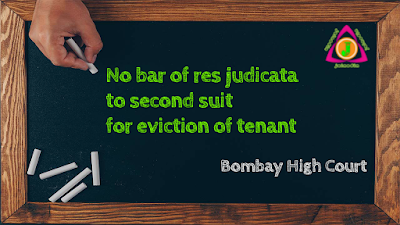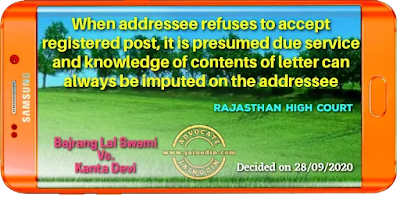30 April 2021
When counsel reports no instructions, it is the duty of the Court to issue notice to the party concerned before proceeding further in the matter
29 September 2020
When addressee refuses to accept registered post, it is presumed due service and knowledge of contents of letter can always be imputed on the addressee
Coming to the issue regarding the alleged non-service of notice under Section 106 of the Act on the appellant, a bare look at the Exhibit-6, which is an undelivered Registered A/D envelop sent to the appellant reveals that the same was sent by the counsel for the plaintiff to the appellant. The appellant in his statement admitted that the address indicated on the envelop was correct. The envelop clearly bears the endorsement made by the postman regarding refusal to receive the article. It is well settled that a notice sent under Section 106 of the Act, if refused by the tenant, the same is a sufficient service of the notice.
Hon'ble Supreme Court in Puwada Venketeswara Rao v. Chidamana Venkata Ramana : AIR 1976 SC 869, observed that
"8. There is presumption of service of a letter sent under registered cover, if the same is returned back with a postal endorsement that the addressee refused to accept the same. No doubt the presumption is rebuttable and it is open to the party concerned to place evidence before the Court to rebut the presumption by showing that the address mentioned on the cover was incorrect or that the postal authorities never tendered the registered letter to him or that there was no occasion for him to refuse the same. The burden to rebut the presumption lies on the Party, challenging the factum of service. In the instant case the respondent failed to discharge this burden as he failed to place material before the Court to show that the endorsement made by the postal authorities was wrong and incorrect. Mere denial made by the respondent in the circumstances of the case was not sufficient to rebut the presumption relating to service of the registered cover.
We are, therefore, of the opinion that the letter dated 24-4-1974 was served on the respondent and he refused to accept the same. Consequently, the service was complete and the view taken by the High Court is incorrect."
09 September 2020
Complaint u/s. 138 of N.I. Act for cheque bounce is maintainable if cheque is presented and gets dishonoured for the second time after the period of first demand notice is expired
03 August 2020
Notice returned with endorsement 'house locked', 'shop closed', "addressee not available' is presumed to be dully served
“It is a recognized rule of interpretation of statutes that expressions used therein should ordinarily be understood in a sense in which they best harmonize with the object of the statute, and which effectuate the object of the Legislature. If an expression is susceptible of a narrow or technical meaning, as well as a popular meaning, the Court would be justifed in assuming that the Legislature used the expression in the sense which would carry out its object and reject that which renders the exercise of its power invalid"[Para No.14]
05 May 2020
Mere service of notice would not give rise to a cause of action
02 May 2020
Tenant is not protected if he fails to pay rent after receipt of notice and during the trial as well as appeal proceeding
30 April 2020
No bar of res judicata to second suit for eviction of tenant






